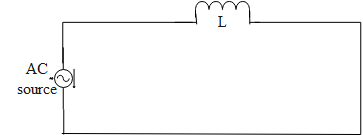Question
Question: Power dissipated in pure inductance will be: A. \(\dfrac{L{{I}^{2}}}{2}\) B. \[2L{{I}^{2}}\] ...
Power dissipated in pure inductance will be:
A. 2LI2
B. 2LI2
C. 4LI2
D. zero
Solution
Power dissipation is the resultant of the hindrance in the path of the current flow due to the resistance offered in the circuit. The greater the amount of the resistance applied in the circuit higher will be the energy loss. The resistance is due to the resistive property of the circuit.
Complete step-by-step answer:
Three passive components can be included in a circuit. Resistor, inductor, and capacitor. These components are responsible for the hindrance in the flow of the current in the circuit. This hindrance occurs due to the resistance offered in the circuit.
A resistor is a leaner component that follows the rules as per the ohm's law. The inductor and capacitor are the energy-storing devices. When we take an account of a pure inductor circuit.
A circuit of the pure inductor is shown here,

Power in a circuit is given by,
P=IVcosθ
In the case of an inductor, the voltage leads the current by an angle of 90∘
So the power of the circuit is given by,
